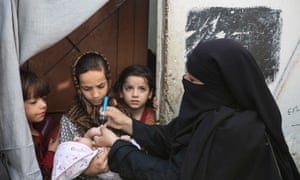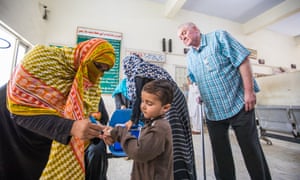News Scan for May 30, 2019 - CIDRAP
News Scan for May 30, 2019 - CIDRAP |
| News Scan for May 30, 2019 - CIDRAP Posted: 30 May 2019 03:20 PM PDT WHO advisors extend polio public health emergencyThe World Health Organization (WHO) polio emergency committee met for the 21st time last week and unanimously agreed that the spread of polio still remains a Public Health Emergency of International Concern (PHEIC) under International Health Regulations. The meeting took place on May 14 at WHO headquarters in Geneva by teleconference, and members reviewed the most recent data on wild poliovirus and vaccine-derived poliovirus spread, the WHO said yesterday in a statement. The group expressed grave concerns about the global increase in wild poliovirus type 1 cases, especially in Pakistan, where 15 illnesses have already been reported this year. They took note of a cluster of cases in Lahore, hinting at vulnerability outside high-risk areas, and increasing numbers of cases during a time of the year when few cases are typically reported. Another big concern was recent attacks on vaccinators and security teams protecting the workers. Equally concerning are multiple circulating vaccine-derived poliovirus type 2 (cVDPV2) outbreaks in Africa, with new strains emerging and the virus spreading into southern Nigeria, including densely populated Lagos, and evidence of missed transmission in Nigeria and Somalia. Taken together, the cVDPV2 situation continues to deteriorate, the advisors said. The group's decision to extend the PHEIC and their temporary recommendations for 3 more months was unanimous. Study finds MRSA transmission varies within and between VA facilitiesA study involving more than 230 Department of Veterans Affairs (VA) hospitals and nursing homes has found significant differences in methicillin-resistant Staphylococcus aureus (MRSA) transmission dynamics within and between the facilities, researchers reported yesterday the journal Epidemics. In the study, researchers from the University of Utah School of Medicine and the VA Salt Lake City Health Care System set out to evaluate the epidemiology of MRSA infection and transmission in the VA system since the VA's MRSA Prevention Initiative was launched at hospitals in 2007 and extended to nursing homes in 2009. The aim of the study was to better understand variation in MRSA transmission within and between facilities, and to identify trends in the transmission since the initiative was implemented. To do that, they looked at electronic health records for patients admitted to 122 VA hospitals from October 2007 through July 2011, and for patients admitted to 111 VA nursing homes from January 2009 through December 2010. The analysis showed that the median baseline MRSA transmission rate in VA hospitals was approximately quadruple that in nursing homes and declined in 46% of hospitals compared with 9% of nursing homes, resulting in 43% reduced transmission across hospitals and a 2% increase across nursing homes. First-time admission prevalence was 18.7% in nursing homes compared with 10.5% in hospitals. In addition, the estimated MRSA clearance rate was much lower in nursing homes than in hospitals. The authors of the study say future research will look at detailed patient and facility characteristics to better understand specific mechanisms and factors that are driving transmission within these facilities. UK pig industry sees decline in antibiotic useNew data show a third straight year of reduced antibiotic use in pig operations in the United Kingdom, the UK Agriculture and Horticulture Development Board (AHDB) announced today. Data collected using the electronic medicine book (eMB), a private antibiotic reporting website for UK pig producers, show that antibiotic use in 2018 dropped by 16% from 2017 to 110 milligrams per population correction unit (mg/PCU). Use of critically important antibiotics in pigs fell to 0.06 mg/PCU. Data taken from eMB represent 89% of all pigs slaughtered in the United Kingdom. The website has a benchmarking function that allows pig producers to compare their antibiotic use with other producers. "The latest reductions in antibiotic use in the UK pig sector reflect the great efforts of pig producers and their vets to champion responsible antibiotic use," AHDB senior veterinary manager Mandy Nevel, PhD, said in an AHDB press release. The reductions in antibiotic use bring the UK pig industry closer to the 2020 target of 99 mg/PCU. |
| The women defying menace and mistrust to rid Pakistan of polio - The Guardian Posted: 14 May 2019 12:00 AM PDT It began with a rumour, a breathless video circulating on Facebook saying children in Peshawar had been taken ill after being vaccinated for polio. Within hours, a second video emerged showing the same children being instructed to lie down and feign illness. But it was too late. The latest attempt to derail Pakistan's formidable drive to eradicate polio had already taken hold, leaving thousands of parents panic-stricken and a government health facility partially burned down. The man who orchestrated the alarmist video was arrested, but Babar Bin Atta, the prime minister's focal person on polio eradication, was plainly exasperated. "The man is a trouble-maker caught red-handed on video telling children to act as though they are ill," he said. "The real enemy is social media." With three days to reach more than 9,000 children in the Mustafabad district of Karachi, workers going door to door are frustrated at having to deal with yet another swirl of misinformation. Yet, armed with essential vaccine drops and children's vitamins – not to mention facts, smartphone videos and the endorsements from doctors, clerics and celebrities that have become an essential part of attempts to eradicate the centuries-old disease in Pakistan – they remain resolute. Nationwide, a quarter of a million frontline workers are involved in efforts to vaccinate the 40 million children in the country under the age of five. Zahoor Jah, 55, a grandfather who lives locally, says the repeated drives can be tedious, especially in areas that aren't well served by health clinics. But he hopes polio will go the way of smallpox.  "It's a lack of education that leads to these things," he says of the Peshawar videos. "But these women are doing a fantastic job of convincing almost everyone. Being local makes a big difference. Everyone recognises them and trusts them." Across town, Syeeda Bahuu, 40, is engaged in vaccination efforts at Karachi Cantonment, the city's main railway station. Originally from Quetta, she moved south to Karachi following "some troubles". Two of her own children have been affected by polio. A typical shift brings in 700 rupees (£7.61) a day. While most children will be vaccinated at home, the team's presence here, and at tollgates into the city, reflects how mobile people's lives can be, from seasonal workers to those visiting family. In three hours, Bahuu has converted 16 refusals into successful vaccinations, using her personal experience and videos from the city's emergency operating centre. In all, 418 children have been inoculated here this morning. Polio is now endemic in just three countries: Pakistan, Afghanistan and Nigeria. Pakistan is tantalisingly close to eradication. The number of cases here has dropped from 306 in 2014 to 13 so far this year, but environmental tests show the virus is still present in the country. Naeemjan Barki was devastated when his young son was diagnosed with polio. Now 11, Naseebullah likes to go out with his father to support vaccination teams in volatile Gulshan Town. He loves cricket, but says not everyone will play with him. Naseebullah seizes the opportunity to go into bat with Jim Bailey, who is visiting Karachi with the One Last Push campaign. At 62, Bailey is a member of the last British generation living with the long-term effects of polio. A former taxi driver from Belfast's Falls Road, he now teaches IT skills to school leavers.  He's here in Karachi to see '"how they are dealing with what we left in the past". Bailey is struck by the resilience of those affected. "It's a massive programme going on here," he says. "I suppose I thought: 'I have polio, that's it, done and dusted, I don't have to be worried about it any more.' But polio can come back. It can affect my kids, my grandkids, unless it is eradicated. It's amazing, the effort the vaccinators have to go to here. They cannot fail." Gulnaz Shirazi, 35, ensures every child entering the social security hospital in the industrial Landhi area of the city is vaccinated. Her deft checks are fuelled by personal involvement. In 2012, as she wrapped up for the day, she heard the shots that killed her sister-in-law and niece, both polio prevention workers, a few streets away. "I decided I couldn't let their lives go to waste. It just made my resolve stronger." Khalida Nasareen, 61, first got involved 22 years ago, when she was a local councillor in Orangi Town, in the city's north. She has been instrumental in recruiting women from the community who have the right skills, education, trust and access. Two health workers were killed in the area in 2012, and it wasn't easy to persuade parents to allow their daughters to vaccinate street to street for 7,500 rupees. "There was a lot of fear, but that has got better since the community-based approach took off," she says. "We build up a relationship with families through hearing their problems, knowing them. We can spot the extra pair of shoes by the doorstep that belong to a visiting child." Now 61, she has taken to getting around by quad bike so that she can quickly be on site if one of her team calls in with problems. Her diabetes means she has numbness in one foot, but nothing will stop her. "You cannot shut the programme until polio is eradicated," she says. "No young child should get the virus these days." |
| You are subscribed to email updates from "polio prevention" - Google News. To stop receiving these emails, you may unsubscribe now. | Email delivery powered by Google |
| Google, 1600 Amphitheatre Parkway, Mountain View, CA 94043, United States | |

Comments
Post a Comment